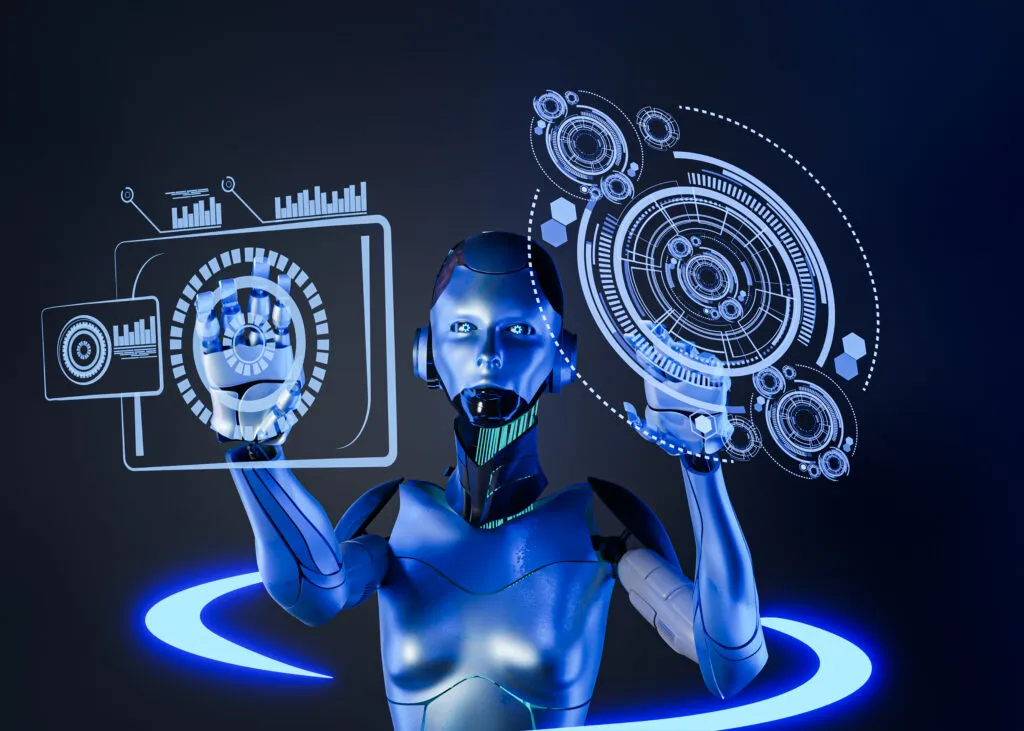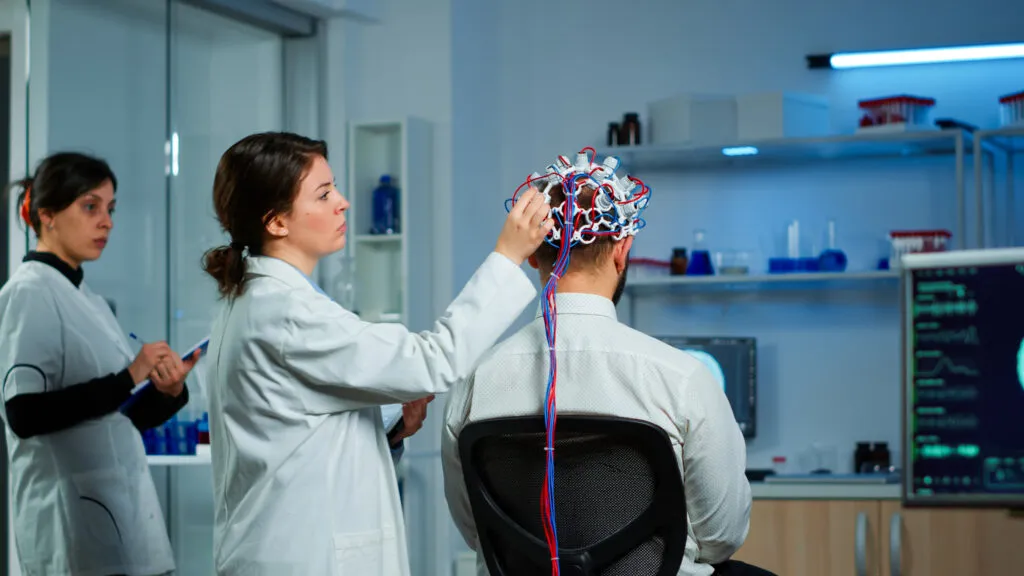How Artificial Intelligence is transforming the world?

How Artificial Intelligence is transforming the world:
Remember 2017? When “artificial intelligence” felt like a futuristic dream, tossed around at conferences and tech expos, promising revolutionary changes but rarely delivering? Fast forward to 2024, and that dream has not only materialized but exploded into a powerful reality. AI is no longer a buzzword; it’s the backbone of businesses across industries, silently orchestrating operations, optimizing decisions, and driving innovation.
This wasn’t a sudden shift. Years of technological advancements, combined with a growing understanding of AI’s potential, laid the groundwork for this transformation. Let’s explore the key factors that propelled AI from the realm of speculation to the heart of business strategy:
1. Democratization of AI: Gone are the days when AI solutions were complex, expensive, and accessible only to tech giants. Today, accessible cloud platforms, pre-trained models, and user-friendly tools have democratized AI. Even small businesses can leverage its power for tasks like customer service, data analysis, and marketing automation.
2. Tangible results: Early AI projects often struggled to demonstrate clear ROI. But by 2024, businesses have amassed mountains of evidence showcasing AI’s impact. From manufacturers predicting equipment failures to retailers personalizing customer experiences, AI is demonstrably boosting efficiency, revenue, and customer satisfaction.
3. Focus on specific problems: Businesses no longer see AI as a magic bullet but rather as a targeted tool for specific challenges. This pragmatic approach leads to focused implementations, like fraud detection algorithms in finance or chatbots handling customer inquiries, that deliver clear wins and build trust in AI’s capabilities.
4. Human-AI collaboration: The fear of robots replacing humans has morphed into a vision of human-AI collaboration. Businesses now understand that AI’s strength lies in augmenting human expertise, not replacing it. From doctors aided by AI-powered diagnostics to designers using AI for creative inspiration, this collaborative approach unlocks the best of both worlds.
5. Ethical considerations: As AI’s influence grows, ethical concerns regarding bias, privacy, and transparency become paramount. Businesses are increasingly prioritizing responsible AI development, implementing ethical frameworks and fostering open discussions about potential pitfalls. This proactive approach builds trust and paves the way for sustainable AI adoption.
The impact of AI is evident across different industries:
Manufacturing: Predictive maintenance and optimized production lines powered by AI minimize downtime and maximize efficiency.
Healthcare: AI-driven diagnostics, drug discovery, and personalized medicine are transforming healthcare delivery and patient outcomes.
Retail: AI personalizes shopping experiences, optimizes inventory management, and predicts customer behavior, leading to increased sales and customer satisfaction.
Finance: AI detects fraud, assesses risk, and automates repetitive tasks, ensuring financial stability and efficiency.
Data access and quality: AI algorithms thrive on data, but access and quality remain hurdles for many businesses.
Talent gap: Finding and retaining skilled AI professionals is crucial, demanding continuous workforce development and education.
Explainability and bias: Ensuring AI decisions are transparent and unbiased requires ongoing effort and collaboration between technologists, ethicists, and policymakers.
Despite these challenges, the future of AI looks bright. As technology continues to evolve, AI will further integrate into our lives, becoming more sophisticated and accessible. Businesses that embrace AI strategically, with a focus on ethics and human collaboration, will be the ones positioned to thrive in the years to come.
Looking ahead:
Expect further democratization of AI, with even more user-friendly tools and pre-trained models emerging.
The focus will shift from basic functionalities to more complex tasks requiring reasoning and creativity, powered by advanced algorithms like Transformers.
Ethical considerations will remain paramount, driving the development of robust frameworks and regulations for responsible AI development.
Human-AI collaboration will become the norm, with AI augmenting human expertise across various domains.
AI is no longer a novelty; it’s the engine driving innovation and growth in today’s business landscape. Those who understand its potential and navigate its challenges will be the leaders of tomorrow.
FAQs:
Is AI all it’s cracked up to be, or is it just hype?
The hype surrounding AI has certainly subsided, but it’s been replaced by tangible results across industries. Businesses are demonstrating tangible ROI through applications like predictive maintenance, personalized customer experiences, and fraud detection. However, not all AI projects are successful, and careful planning and ethical considerations are crucial.
Can small businesses leverage AI’s power, or is it just for tech giants?
The beauty of 2024’s AI landscape is its accessibility. Cloud platforms, pre-trained models, and user-friendly tools have democratized the technology, making it available to businesses of all sizes. Even small companies can utilize AI for tasks like marketing automation, data analysis, and customer service automation.
Won’t AI replace human jobs? What about the ethical concerns?
The fear of AI replacing humans has shifted towards a vision of collaboration. AI excels at augmenting human expertise, not replacing it. Doctors aided by AI diagnostics, designers using AI for inspiration, and customer service representatives assisted by AI chatbots are just a few examples. Ethical considerations regarding bias, privacy, and transparency are paramount, and responsible development is crucial.
What industries are seeing the biggest impact from AI right now?
Manufacturing, healthcare, retail, and finance are witnessing significant transformations. Predictive maintenance minimizes downtime in manufacturing, while personalized medicine and AI-driven drug discovery are changing healthcare. Retailers are leveraging AI for personalized shopping experiences, optimized inventory management, and customer behavior prediction. In finance, AI detects fraud, assesses risk, and automates repetitive tasks, ensuring financial stability and efficiency.
Must read:
What Causes Numbness in Hands While Sleeping?
Secrets of DMT Meditation: What Is DMT Meditation and How Does It Work?
Benefits of Cirkul Water Bottle for On-the-Go Hydration | 2023
Why Does Conjunctivitis Eye Infection Happen? | Pink Eye | 2023
Exploring the Exciting World of AI Technology | 2023
Top 8 Japanese Dog Breeds: A Closer Look at the Most Beloved and Iconic Breeds from Japan
Reason Behind Pollution in Delhi in Winter Season: Causes and Solutions
A Festival of Lights and Togetherness in India
Why is Quantum Computing Useful For Optimization Problems? | Reshaping Industries | 2023
Do You Know? – How to apply for overseas education loan in India
New Heights: The Race for America’s Tallest Building | 2024








